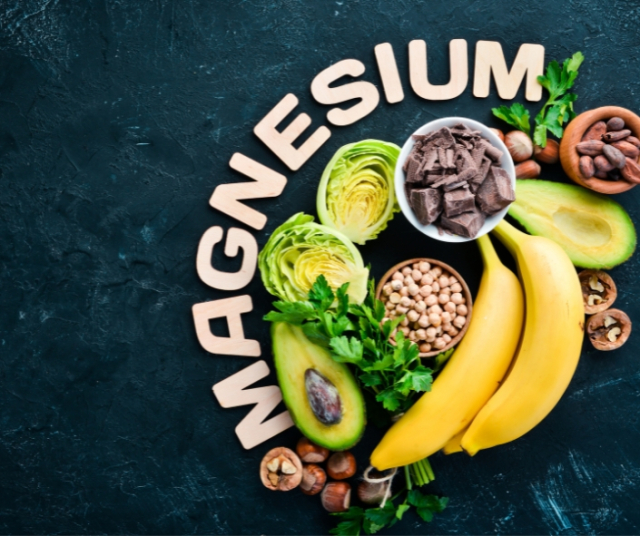Magnesium is an essential mineral that plays a fundamental role in numerous functions of the human body. Although it often goes unnoticed, its importance should not be underestimated.
Functions of Magnesium in the Body
Bone Strengthening
Magnesium is essential for the formation and maintenance of strong bones. It works in conjunction with calcium and vitamin D to ensure proper absorption of calcium into the bones. An adequate intake of magnesium can contribute to the prevention of bone diseases such as osteoporosis.
Muscle and Nervous Function
Magnesium plays a vital role in muscle and nerve function. It acts as a muscle relaxant, helping to prevent muscle cramps and spasms. Additionally, it regulates the transmission of nerve signals, which is essential for maintaining a healthy nervous system.
Regulation of Heart Rate
The heart is a muscle, and efficient heart function relies heavily on magnesium. This mineral helps maintain normal heart rhythm and can help prevent cardiac arrhythmias.
Electrolyte Balance
Magnesium works in conjunction with other electrolytes, such as sodium, potassium, and calcium, to maintain water balance in the body. This balance is essential to regulate blood pressure and prevent fluid retention.
Energy production
Magnesium is used by the body's cells to convert food into usable energy. It participates in biochemical reactions that are crucial for the production of adenosine triphosphate (ATP), the main source of cellular energy.
Blood Sugar Regulation
Magnesium plays an important role in regulating blood glucose. It contributes to the action of insulin, helping to maintain stable blood sugar levels. Magnesium deficiency may be associated with an increased risk of type 2 diabetes.
Magnesium Sources
Although magnesium is found in a variety of foods, many people do not meet the recommended daily intake. Some rich sources of magnesium include:
Dried fruits and seeds: Almonds, walnuts, sunflower seeds.
Green leafy vegetables: Spinach, chard, kale.
Legumes: Beans, lentils, chickpeas.
Whole grains: Oats, brown rice, quinoa.
Fish: Salmon, halibut.
Dairy products: And ogur, milk.
It is important to maintain a balanced diet that includes these sources to ensure adequate magnesium intake.
Signs of Magnesium Deficiency
Magnesium deficiency is more common than believed and can have significant health consequences. Some signs of magnesium deficiency include:
- Muscle cramps and spasms: Lack of magnesium can cause involuntary muscle contractions.
- Fatigue and weakness: Magnesium is vital for energy production, and deficiency can cause fatigue.
- Nausea and vomiting: Lack of magnesium can affect the gastrointestinal system.
- Heart problems: Magnesium deficiency has been linked to an increased risk of heart disease.
Benefits of Magnesium for Mental Health
In addition to its physical benefits, magnesium also plays a crucial role in mental health. Some of these benefits include:
1. Reduction of Stress and Anxiety
Magnesium has relaxing properties that can help reduce stress and anxiety levels. It contributes to the regulation of the stress hormone, cortisol, helping to maintain emotional balance.
2. Improved Sleep
Lack of magnesium has been associated with sleep disorders, such as insomnia. Increasing your magnesium intake can help improve sleep quality and reduce difficulty falling asleep.
3. Support in Depression
Some research suggests that magnesium may play a role in supporting people with depression. Magnesium deficiency has been found to be linked to an increased risk of depression.
Important considerations
Although magnesium offers a wide range of health benefits, it is essential to keep a few considerations in mind:
Recommended Dosages and Supplements
While it is possible to get magnesium through diet, some people may need supplements to meet their daily needs. However, it is crucial not to exceed the recommended doses, as too much magnesium can cause side effects such as diarrhea and upset stomach.
Drug Interactions
Consulting with a health professional before starting any magnesium supplement is essential, especially if you are taking medications. Magnesium can interact with certain medications, affecting their absorption or effectiveness.
Deficiency Risk Factors
Some medical conditions, such as gastrointestinal and kidney diseases, can increase the risk of magnesium deficiency. Additionally, excessive alcohol consumption and a poor diet can contribute to deficiency.
Magnesium is an essential mineral for the overall health of the body and mind. From bone strength to blood sugar regulation and stress reduction, its benefits are diverse and fundamental. Maintaining a balanced diet that includes rich sources of magnesium is crucial to ensure adequate intake.
